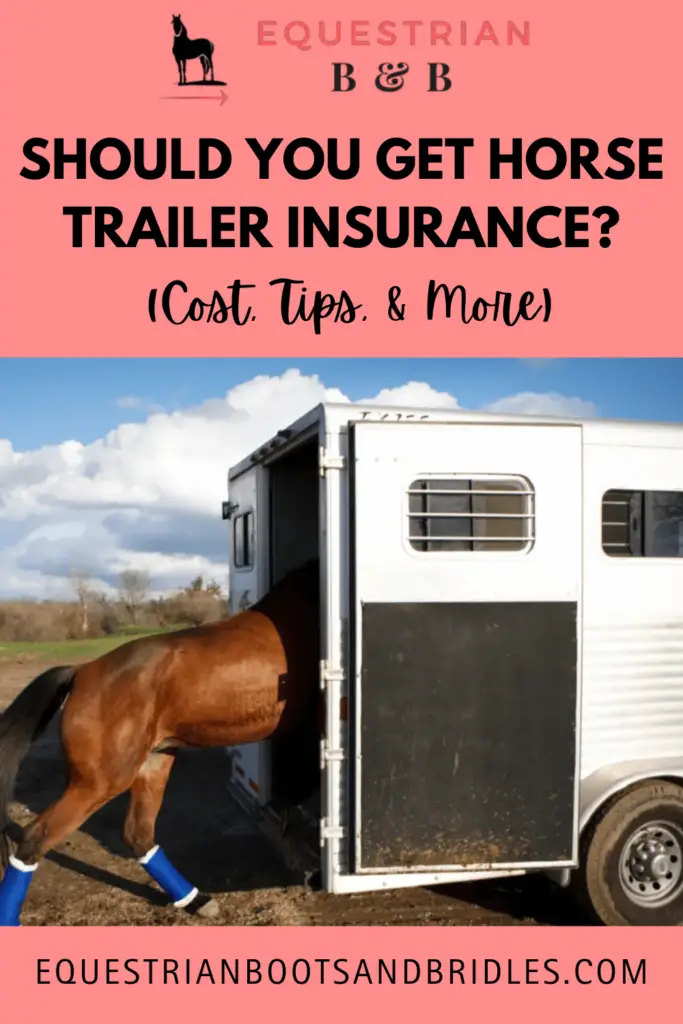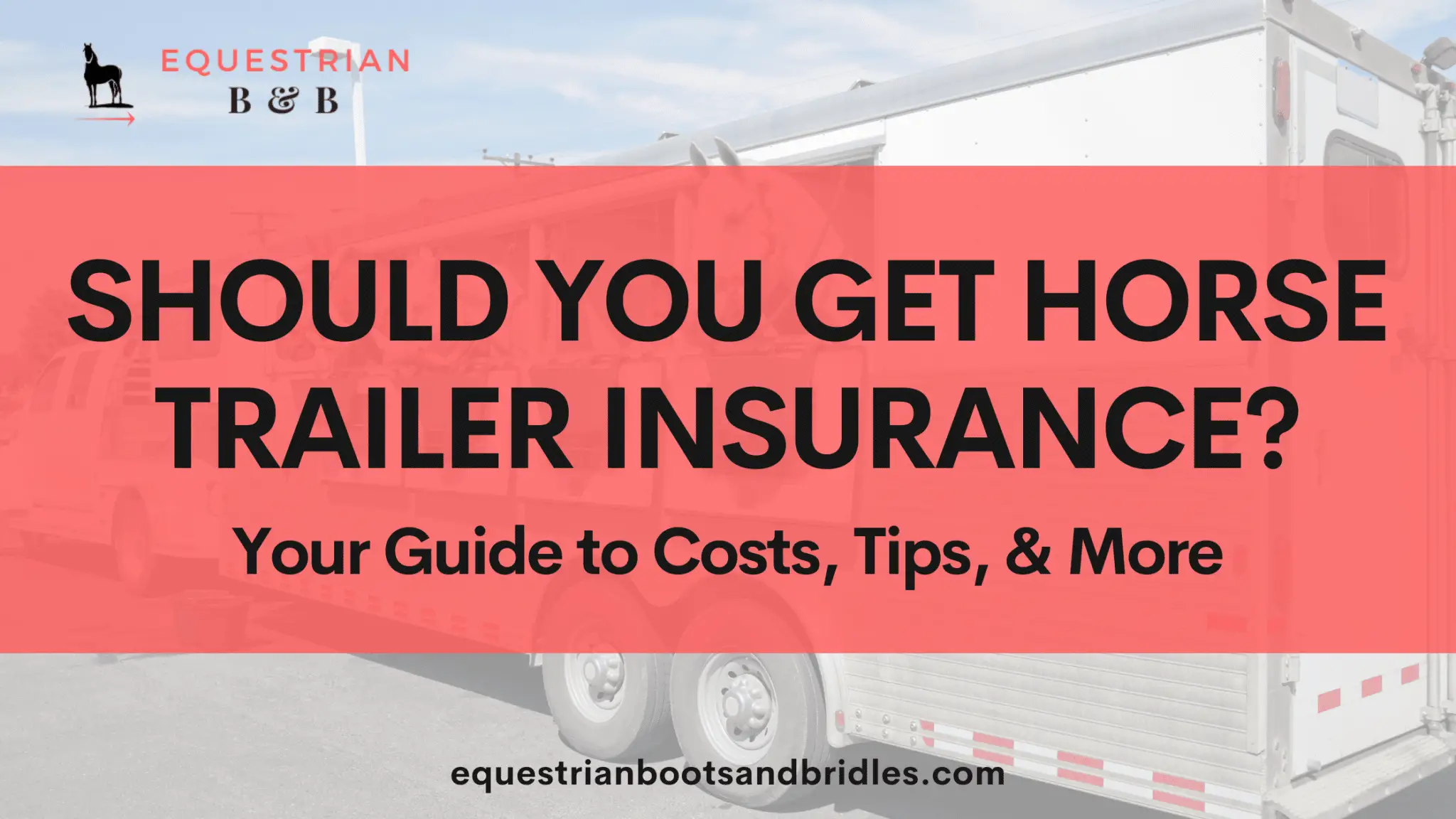The short answer to the question is: yes, you should get horse trailer insurance. Your horse trailer is a piece of equipment that you’ll find you can’t do without because of the convenience it offers. This is true of a 40-year-old trailer that’s still sound as well as a brand-new custom trailer with all of the bells and bells you can’t live without. Your trailer offers you freedom to go to shows, trailer to far-away destinations, and explore the country. And importantly, it also enables you to get your horse to the vet clinic for an emergency.
Many car insurance companies will cover your horse trailer if it’s attached to your vehicle and something happens, but if the trailer is unhooked, there’s no coverage at all. Some auto insurance will not cover your hooked-up trailer automatically, but they will give you the option of extending your coverage if you want to. Other insurance companies may require separate policies to cover your trailer.
Either way, protecting your investment with a separate insurance policy can save you from a world of heartbreak and inconvenience if it gets damaged or stolen. Here’s a look at what horse trailer insurance covers and how to use it to your advantage.
(By the way, this guide will help you learn how to properly get your horse loaded into the trailer.)
This article contains affiliate links, which means we may earn commission if you choose to make a purchase (at no extra cost to you).
Is Horse Trailer Insurance a Necessity?
As previously mentioned, most auto insurance policies will cover your trailer while it’s connected to your tow vehicle. That means you’ll get reimbursed for its value if you happen to have an accident while towing. You’ll want to look at your policy or talk to your insurance agent to find out the exact type of coverage provided as the policy may not cover certain items.
But it’s important for you to remember that coverage of your trailer from your auto insurance policy stops the moment you unhook your trailer. You’re not covered for anything that happens to the trailer while it’s standing alone or gets stolen. If your trailer is damaged by severe weather while unhooked from your vehicle, this would also not be covered by your auto insurance. For this reason, it’s advisable to get a separate horse trailer insurance policy to protect you against vandalism, theft, or weather, as well as have comprehensive coverage in the event of a collision.
You can bundle horse trailer insurance with your auto insurance policy or get a stand-alone policy depending on your needs.
Average Cost of Horse Trailer Insurance
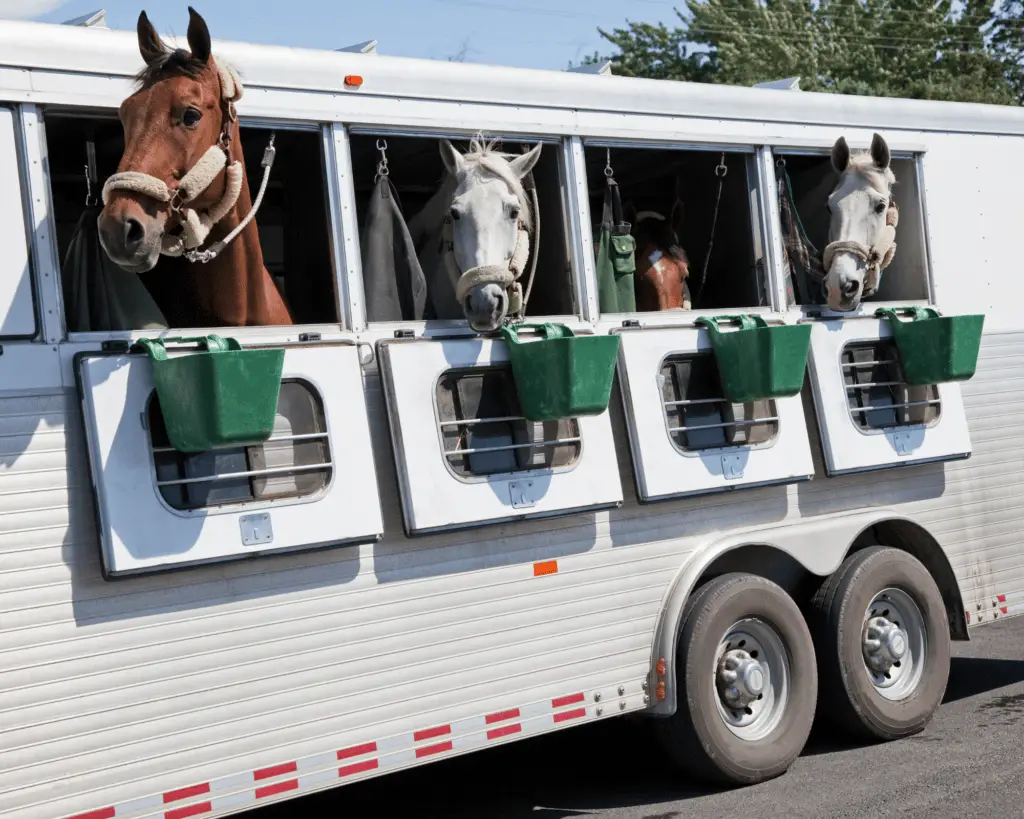
You can expect to pay around $350 USD a year for an insurance policy, but other factors influence how much you actually pay. They include:
- the age of the trailer
- trailer type
- construction
- replacement cost
- where you store your trailer
- geographic location
Additionally, you may also be asked:
- how far you travel with the trailer
- its overall use
- how many horses it can haul
- what you intend to store inside the trailer
Factors that influence the cost of horse trailer insurance
Before you call your insurance agent for a quote, you’ll need to let them know the following information about the trailer:
- Trailer type
- Gross vehicle weight rating of the empty trailer
- Maximum weight rating of the trailer when full
- Retail price
- Primary use of the trailer
- Any equipment attached to the trailer
- Primary tow vehicle
Once the insurance agent has this information, they can look into finding you a quote for a policy that has the kind of coverage you’re seeking.
The agent may also ask you where the trailer is going to be stored. This can affect your ability to get coverage, but not always.
Getting the Right Coverage for Your Trailer
Horse trailer insurance policies can be tailored to meet your needs, but you also want to be sure that it’ll protect you in a manner that meets your expectations. That means including certain types of coverage and finding out if the policy will provide assistance when needed.
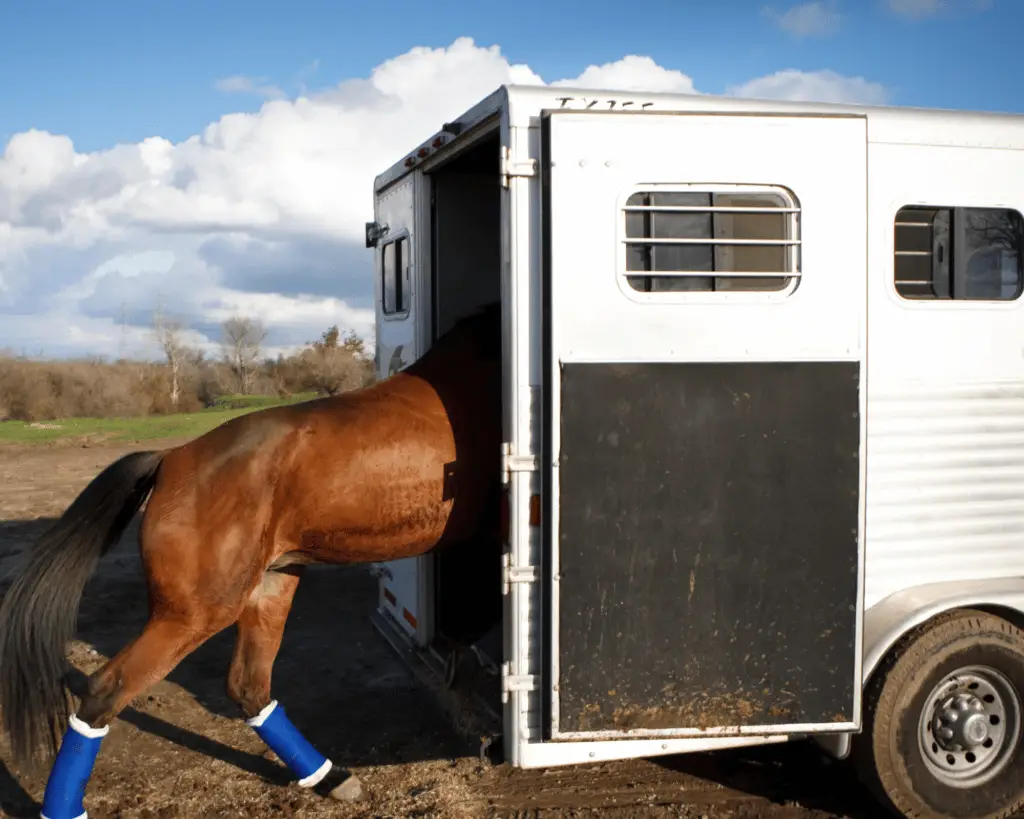
Covering the contents and equipment inside of your trailer
Traveling to a show or destination means you’re also bringing along thousands of dollars worth of tack and equipment that’s more convenient to leave in the trailer. Unfortunately, thieves are aware of this fact, which means trailer break-ins are a potential risk. Make sure that the policy you’re interested in getting has coverage for this type of an event.
Comprehensive and Collision Coverage
Your auto insurance usually provides liability coverage only in the event of an accident. It won’t cover the cost of replacing the trailer. Getting comprehensive and collision coverage means you’re covered for repairs or replacement of the trailer after an accident. Ask your agent about this coverage to make sure that it’s included in the policy. You’ll also want to ask about replacement value because some types of trailers can depreciate rapidly in value.
Roadside assistance
Normally, when you break down on the road, you can call a towing company to get you and your vehicle to a repair shop. A breakdown with a trailer attached to your vehicle makes it more difficult to get towed, as towing companies aren’t usually equipped for this type of service. Roadside assistance for trailers means you won’t have to leave your trailer by the side of the road with your equipment and horses in it, and can get everyone to safety. This type of assistance also helps you with a tire blowout as the responder will be equipped to handle changing the tire on a trailer.
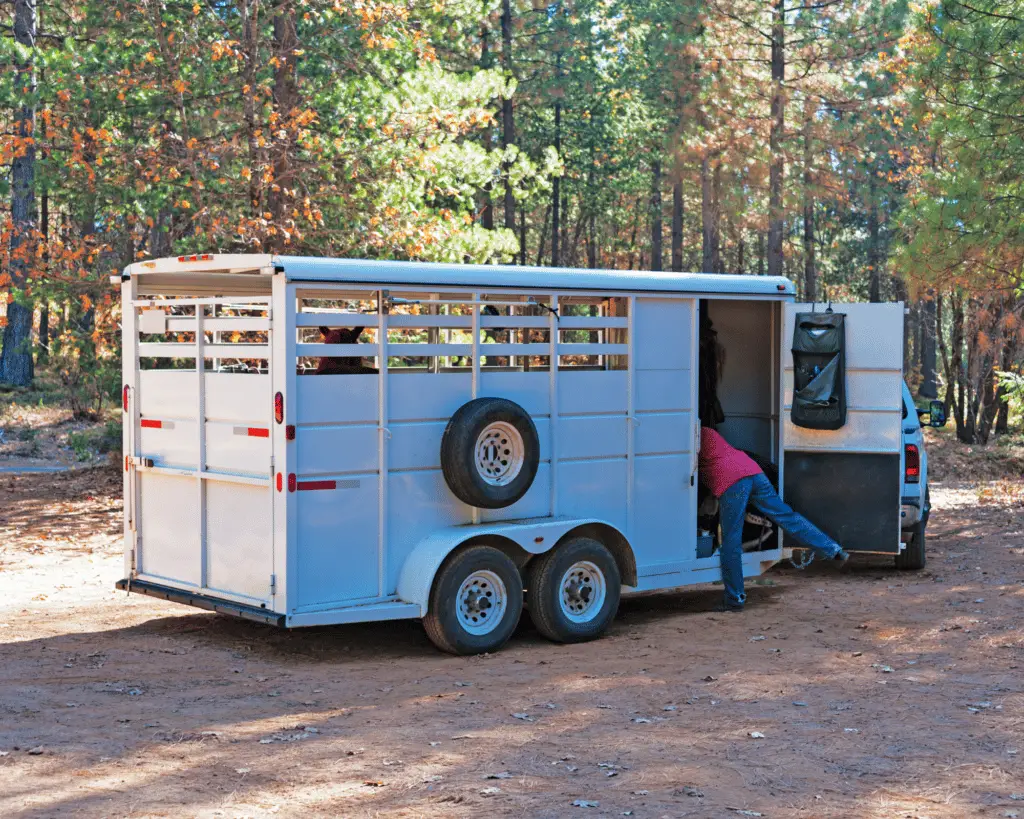
Expenses Covered After an Accident or Loss
Depending on the riders you have in your policy, you can get your loss covered in its entirety or get reimbursed for certain costs. You can get coverage for issues that include:
- Theft of the trailer
- Theft of property stored inside the trailer
- Cost of hauling the trailer after an accident
- Boarding horses after an accident
- Tack lost to theft or damage
- Veterinary bills for your horse
This type of coverage is usually known as comprehensive because it anticipates different types of calamities and covers them in the event they become reality.
How to Find Horse Trailer Insurance
All the major insurance companies offer horse trailer insurance policies, but it’s worth checking around for coverage and quotes. The major companies are in competition with each other and strive to offer policies that offer comprehensive coverage and pricing. If you don’t find what you’re looking for with one of the majors, you have the option to get a quote from an insurer that specializes in horse trailer insurance.
As you search for “horse trailer insurance near me”, you’ll get hits from insurers with names you may not recognize. First, don’t dismiss them as being not worth your time, and second, give their website a look to learn more about their policies. Many independent insurance agencies have been in business for decades, have an excellent track record with claims, and fully understand the process of insuring a horse trailer. In turn, you get to talk to someone who knows what’s involved in this type of insurance and gets you the coverage you’re seeking.
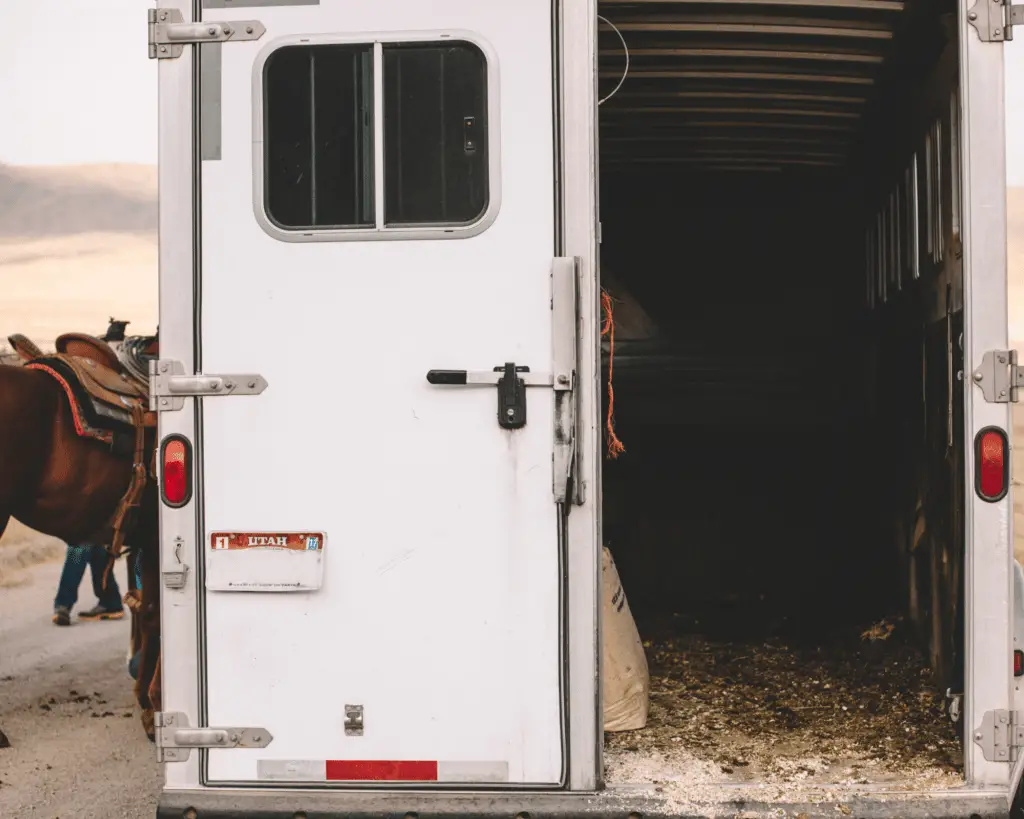
Bundling Your Insurance Policies Together
Horse trailer insurance is typically very affordable on its own, but you may wish to bundle all of your policies together under an umbrella policy. An umbrella policy brings together your home and auto insurance together with a trailer insurance policy along with any other type of insurance you need to carry. This serves to reduce costs for all of your policies, while providing you with the coverage you need for your peace of mind.
What About Horse Trailer Rental Insurance?
If you’re renting your trailer instead of buying, most horse trailer rental companies will offer insurance that comes with your rental… Just make sure you ask what exactly that insurance covers (and what it doesn’t) before you sign your rental agreement. There may be an additional opt-in you want or need to sign up for.
See this article for our full guide to horse trailer rentals.
Reducing the Risk of Losing Your Trailer
Insurers sometimes reward policy holders that put in the effort to minimize the risk of theft and damage. Thieves will steal a trailer from anywhere they happen to find it resting, but you can foil them by locking the wheels and hitch. Special locks are available that let you lock the wheels together or with a wheel clamp that’s similar to a car boot. The locks are designed to block easy access to the lock hasp and prevent thieves from using an angle grinder to cut it off.
Hitch locks (like this one) connect or clamp the hitch receiver into a position that can’t be moved without taking out the lock. They, too, are designed to make it nearly impossible for a thief to access the lock hasp for removal.
Most trailers come with doors that can be closed with a lock, or have locks on the doors that require a key to open. The windows are another area of access, but they can also be locked shut to prevent someone from getting inside. In the event the trailer has locks built in, be sure to keep them in good working order. Trailers that don’t have locks can be outfitted with purpose-designed locks.
The more you lock down your trailer, the harder it is for someone to gain access or steal it outright. A thief will move onto a trailer that has less protection and leave yours alone when they see multiple locks in good working order on your trailer.
Getting Horse Trailer Insurance is Getting Peace of Mind
Accidents with horse trailers aren’t common, but other issues including tire blowouts and thefts are more likely to happen. Insurance gives you peace of mind knowing that you’ll have financial coverage for replacing your trailer, any equipment inside of it, and bills related to the care of your horse. It’s a small expense when compared to the security you gain from knowing you don’t have to pay out of pocket after an accident or loss.
Like this post? Save it on Pinterest. Follow me on Pinterest.
